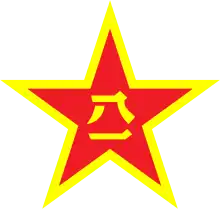| Type 63 107mm rocket launcher | |
|---|---|
 Type 63 rocket launcher | |
| Type | Multiple rocket launcher |
| Place of origin | People's Republic of China |
| Service history | |
| Used by | People's Republic of China, Soviet Bloc, non-aligned, others |
| Wars | |
| Production history | |
| Designed | 1961 |
| Manufacturer | State Factory 847 |
| Produced | 1963–? |
| Variants | Type 81 SP version on truck |
| Specifications | |
| Mass | 602 kg (1,327 lb) |
| Length | 2.90 m (9 ft 6 in) |
| Width | 1.65 m (5 ft 5 in) |
| Height | 0.91 m (3 ft) |
| Crew | 5 |
| Shell | HE, HE-I and HE-frag |
| Caliber | 106.7mm |
| Carriage | Split trail |
| Elevation | −3° to +57° |
| Traverse | 32° |
| Muzzle velocity | 385 m/s (1,260 ft/s) |
| Maximum firing range | 8.05 km (5 mi) |

The Type 63 multiple rocket launcher is a towed, 12-tube, 107mm rocket launcher produced by the People's Republic of China in the early 1960s and later exported and manufactured globally. Although no longer serving with active infantry units, the Type 63 is still in People's Liberation Army service with specialized formations such as mountain infantry units and special forces detachments.[5] The Type 63 was widely used in the PLA until the late 1980s. It was adopted as the successor of the Type 50-5 of 102mm.
China has also developed a Type 63 multiple rocket launcher of 130mm. The RPU-14 is a Soviet 140mm MRL of similar design to the Type 63.
Description

The launcher's 12 tubes are arranged in three removable rows of four each, mounted on a single-axle carriage with rubber tires. The Type 63 originally fired an 18.8 kilogram rocket (Type 63-2)[6] with a 1.3 kilogram warhead.[7] Ammunition for the Type 63 was later improved (Type 75 and Type 81 series), although the overall weight of the rocket remained the same.[5] A fixed amount of propellant is contained in the rocket motor. The steel-cased rocket is stabilized with spin imparted by six angled nozzles in its base. Type 63 rockets may be launched without the launcher; improvised firing can employ tubing, rails or even dirt berms.[8][9] The Type 63 was distributed on the basis of six per infantry regiment, or 18 per infantry division.[10] For airborne and mountain units the lighter Type 63-I was developed.[11]
Both the Type 63 and its copies can be mounted on different kinds of armoured and unarmoured vehicles, for example the MT-LB, the Safir, the Mamba, the RG-32 Scout, the GAZ-66 and the M113.
Licence versions
The Type 63 and its rockets are license-built in several countries including:
- Sudan – Taka.[12]
- Iran – Fajr-1 of D.I.O. with Haseb-1 rocket.[13]
- South Africa – RO 107 of Mechem Developments.[14]
- North Korea – Type 75.
- North Vietnam, Vietnam – H-12.
- Turkey – T-107 of MKEK with rockets TR-107 "Anadolu" and TRB-107.[15]
- Egypt – RL812/TLC of the Helwan Machinery and Equipment Factory (Factory 999).[16][17]
BM-12 nomenclature issue
NATO and western sources have used the Soviet-style designation BM-12 to describe this weapon system, and further even ascribe Soviet origin and initial manufacture of both launcher and rockets.[18] However, there is no evidence in non-western sources of Soviet development or production, or of the BM-12 moniker being applied. Very similar Type 50-5 or Type 488 102mm rockets were manufactured in China and used in the Korean War prior to development of the Type 63.[19]
It appears the systems designated BM-12 (for example in Afghanistan and Libya) were or are all of Chinese origin, being merely used or cross-traded by Soviet interests.
Variants
Multiple rocket launchers
- The Chinese Type 81 SPMRL 107mm is a self-propelled export version, based on the Nanjing NJ-230 truck.[20]
- North Korea has developed versions with 18 and 24 launch tubes that are mounted on vehicles such as the tracked VTT-323 or the wheeled M1992.[20]
- ROKETSAN of Turkey has designed an improved 107mm multiple rocket launch system, consisting of a HMMWV with two 12-round launch modules and a fire control system. The system uses the TR-107 and TRB-107 rockets but the range has been increased to 11 km.[21]
Single-tube rocket launchers
A number of countries have developed single-tube, man-portable rocket launchers that fire the same type of rockets:
Operators
Current operators

 Afghanistan[26]
Afghanistan[26] Albania – 270.[20]
Albania – 270.[20] Azerbaijan
Azerbaijan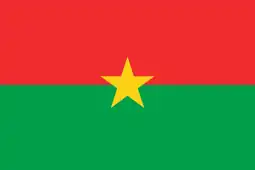 Burkina Faso – ~4 as of 2021[27]
Burkina Faso – ~4 as of 2021[27]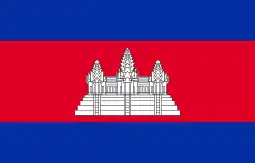 Cambodia[28]
Cambodia[28] Chad[29]
Chad[29] People's Republic of China[30]
People's Republic of China[30] Congo-Kinshasa – 12 as of 2021[31]
Congo-Kinshasa – 12 as of 2021[31] Djibouti[32]
Djibouti[32]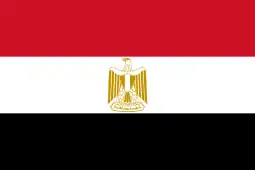 Egypt - Manufactured locally as RL812/TLC
Egypt - Manufactured locally as RL812/TLC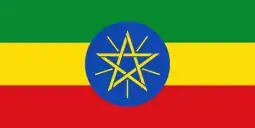 Ethiopia – 25
Ethiopia – 25 Gabon - 25 as of 2021[33]
Gabon - 25 as of 2021[33] Ghana – ~3 as of 2016[34]
Ghana – ~3 as of 2016[34] Indonesia
Indonesia Iran – 1,300 as of 2020[35]
Iran – 1,300 as of 2020[35]
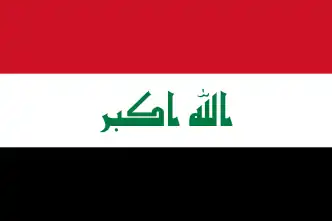 Iraq[37]
Iraq[37]
 Jordan
Jordan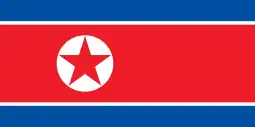 North Korea[39]
North Korea[39] Libya[40]
Libya[40]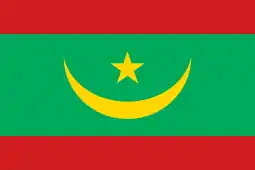 Mauritania – 4 as of 2016[41]
Mauritania – 4 as of 2016[41]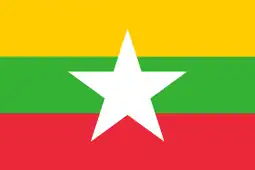 Myanmar – 30 as of 2016[42]
Myanmar – 30 as of 2016[42] Nicaragua – 33 as of 2016[43]
Nicaragua – 33 as of 2016[43] Pakistan – Type-81 variant in service as of 2021[44]
Pakistan – Type-81 variant in service as of 2021[44]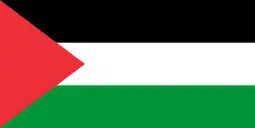 Palestine Liberation Organisation[20]
Palestine Liberation Organisation[20]- People's Defense Units (YPG)[45]
 South Africa – (Launchers captured in Angola, rockets manufactured locally)[3]
South Africa – (Launchers captured in Angola, rockets manufactured locally)[3] South Sudan[46][4]
South Sudan[46][4] Sudan – 477 as of 2016[47]
Sudan – 477 as of 2016[47] Syria[48]
Syria[48] Turkey – Manufactured locally as TR-107.
Turkey – Manufactured locally as TR-107. Somaliland: estimated12 [49]
Somaliland: estimated12 [49] Venezuela - Fajr 1[50]
Venezuela - Fajr 1[50]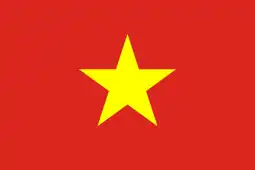 Vietnam – Fielded during the Vietnam War.[51] 360 as of 2016[52]
Vietnam – Fielded during the Vietnam War.[51] 360 as of 2016[52] Zimbabwe – 16 as of 2016[53]
Zimbabwe – 16 as of 2016[53]
Former operators
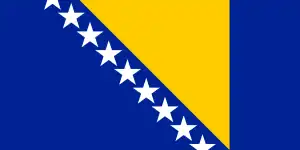 Bosnia and Herzegovina – Former user[20]
Bosnia and Herzegovina – Former user[20] Lebanon
Lebanon
 Liberation Tigers of Tamil Eelam: 2[55]
Liberation Tigers of Tamil Eelam: 2[55] Malaysia – retired
Malaysia – retired Tigray Defense Forces[56] − Surrendered to the Ethiopian forces in the aftermath of the Tigray War[57]
Tigray Defense Forces[56] − Surrendered to the Ethiopian forces in the aftermath of the Tigray War[57]
See also
Notes
- ↑ Isby, David C. (1990). The War in Afghanistan 1979–1989: The Soviet Empire at High Tide. Concord Publications. pp. 46–47. ISBN 978-9623610094.
- ↑ Ismay, John (17 October 2013). "Insight Into How Insurgents Fought in Iraq". New York Times.
- 1 2 Heitman, Helmoed-Römer (2013). The Battle in Bangui: The Untold Story. Johannesburg: Parktown Publishers. p. 7. ISBN 978-0-9921902-8-6.
- 1 2 The Military Balance 2016, p. 492.
- 1 2 "sinodefence.com". sinodefence.com. Archived from the original on 23 January 2010. Retrieved 12 April 2018.
- ↑ JAA, p. 594.
- ↑ "fas.org". fas.org. Retrieved 12 April 2018.
- ↑ Jeremy Kelly (August 21, 2012). "Despite drones and blimps, rocket attacks in Afghanistan prove hard to stop". Christian Science Monitor.
- ↑ Brian Anderson (2012). "Chinese-Made 107mm Rockets Are the Workhorses of Insurgencies (and Goons)". Motherboard. Archived from the original on 2015-04-08.
- ↑ JAA, p. 593.
- ↑ "Type 63 107mm Rocket". Fas.org. Retrieved 2013-04-01.
- ↑ MIC page on Small Arms including Taka
- ↑ Defense Industries Organization 2013 Catalog, Section 3: Rocket Industries Group.
- ↑ "Defense & Security Intelligence & Analysis: IHS Jane's | IHS". Articles.janes.com. Archived from the original on 3 May 2012. Retrieved 2013-04-01.
- ↑ http://www.acig.info/CMS/?option=com_content&task=view&id=190&Itemid=47
- ↑ "Defense & Security Intelligence & Analysis: IHS Jane's | IHS". Articles.janes.com. Retrieved 2013-04-01.
- ↑ "Egypt :: Helwan Machinery and Equipment Co. .::. حلوان للآلات و المعدات :: تفاصيل المنتجات الحربيه". Fact999.momp.gov.eg. Archived from the original on 2011-12-20. Retrieved 2013-04-01.
- ↑ Jalali; Ali Ahmad, & Grau; Lester W., (2002), Afghan Guerrilla Warfare: In the Words of the Mujahideen Fighters, Zenith Imprint, pg. 407, ISBN 0760313229
- ↑ http://www.janes.com/articles/Janes-Armour-and-Artillery/NORINCO-107-mm-12-round-Type-63-and-Type-81-multiple-rocket-systems-China.html Type 63
- 1 2 3 4 5 6 Foss, Christopher F. (15 June 1998). "Norinco 107 mm (12-round) Type 63 and Type 81 multiple rocket systems". Jane's Armour and Artillery 1998–99.
- ↑ "Defense & Security Intelligence & Analysis: IHS Jane's | IHS". Articles.janes.com. Retrieved 2013-04-01.
- 1 2 3 Emin, Zafer (2016-11-29). "Roketsan 107 mm çok namlulu roketatar". Teknoformat (in Turkish). Retrieved 2021-04-06.
- ↑ Foss, Christopher F. (15 June 1998). "Lightweight man-portable and vehicle-mounted systems". Jane's Armour and Artillery 1998-99.
- ↑ "Mechem Developments 107 mm Inflict (single-tube) rocket launcher". Articles.janes.com. 6 March 2012. Archived from the original on 3 May 2012. Retrieved 2013-04-01.
- ↑ Oryx. "The Oryx Handbook of Iranian Fighting Vehicles". Oryx Blog. Retrieved 2021-04-14.
- ↑ Bhatia, Michael Vinai; Sedra, Mark (May 2008). Small Arms Survey (ed.). Afghanistan, Arms and Conflict: Armed Groups, Disarmament and Security in a Post-War Society. Routledge. p. 66. ISBN 978-0-415-45308-0.
- ↑ The Military Balance 2021, p. 452.
- ↑ The Military Balance 2016, p. 239.
- ↑ The Military Balance 2016, p. 437.
- ↑ The Military Balance 2016, pp. 242–246.
- ↑ The Military Balance 2021, p. 461.
- ↑ Debay, Yves (2004). VBL Panhard (in French). Histoire et collections. p. 120. ISBN 9782913903166.
- ↑ The Military Balance 2021, p. 467.
- ↑ The Military Balance 2016, p. 448.
- ↑ The Military Balance 2016, p. 328.
- ↑ Puxton, Matteo (25 February 2019). Macé, Maxime (ed.). "Pour se battre en Syrie, l'Iran enrôle massivement des Afghans chiites". France Soir (in French).
- ↑ Iraqi army equipment 1930–2017. Vol. 2. p. 81.
- ↑ Puxton, Matteo (30 August 2017). "Kataib al-Imam Ali, cette puissante milice chiite qui se bat à la fois en Irak et en Syrie". France Soir (in French).
- ↑ The Military Balance 2016, p. 265.
- ↑ The Military Balance 2016, p. 342.
- ↑ The Military Balance 2016, p. 343.
- ↑ The Military Balance 2016, p. 276.
- ↑ The Military Balance 2016, p. 406.
- ↑ The Military Balance 2021, p. 290.
- ↑ Mitzer, Stijn; Oliemans, Joost (29 October 2021). "Kurdish Armour: Inventorising YPG Equipment In Northern Syria". Oryx Blog.
- ↑ The Military Balance 2016, p. 469.
- ↑ The Military Balance 2016, p. 471.
- ↑ The Military Balance 2016, p. 354.
- ↑ The Military Balance 2006, p. 468.
- ↑ https://observers.france24.com/en/americas/20240110-venezuela-zolfaghar-boats-military-material-tehran-iran-caracas
- ↑ Zabecki, David T. (May 2011). "Rockets and Rocket Launchers". In Tucker, Spencer C. (ed.). The Encyclopedia of the Vietnam War: A Political, Social, and Military History (2 ed.). p. 988. ISBN 978-1-85109-960-3.
- ↑ The Military Balance 2016, p. 297.
- ↑ The Military Balance 2016, p. 478.
- ↑ Zaloga, Steven J. (2003). Tank Battles of the Mid-East Wars (2): The Wars of 1973 to the Present. Hong Kong: Concord Publications. p. 66. ISBN 962-361-613-9.
- ↑ Humanitarian Operation Factual Analysis July 2006 – May 2009 (PDF). Ministry Of Defence Democratic Socialist Republic Of Sri Lanka. Retrieved 9 September 2021.
- ↑ Oryx. "The Tigray Defence Forces - Documenting Its Heavy Weaponry". Oryx Blog. Retrieved 2021-09-03.
- ↑ Misikir, Maya (11 January 2023). "Tigray Forces Start Handing Over Heavy Weapons as Part of Peace Deal". Voice of America. Retrieved 11 January 2024.
References
- (JAA) Jane's Armour and Artillery 1981–82, Christopher Foss (ed.), London: Jane's Publishing Company Ltd., 1981. ISBN 0-7106-0727-X.
- International Institute for Strategic Studies (2006). The Military Balance 2006. Routledge. ISBN 978-1-85743-399-9.
- International Institute for Strategic Studies (February 2016). The Military Balance 2016. Vol. 116. Routlegde. ISBN 9781857438352.
- International Institute for Strategic Studies (February 2021). The Military Balance 2021. Vol. 121. Routledge. ISBN 9781032012278.
External links
- OrData report on 107-mm rocket projectile
- GlobalSecurity on the Type 63 and Type 81
- Mao's Rockets and the Eastern Afghan Border War, Part I Part II Part III, article series about the use of Type 63 rockets in Afghanistan.
